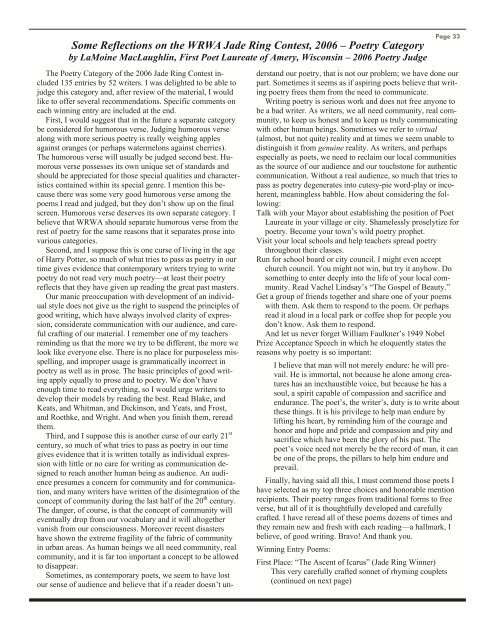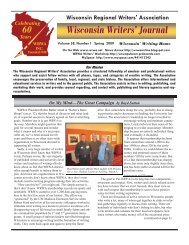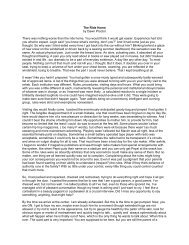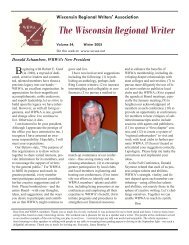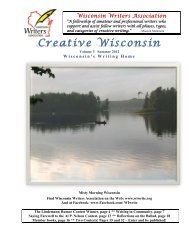WRWA Newsletter.pub - Wisconsin Writers Association
WRWA Newsletter.pub - Wisconsin Writers Association
WRWA Newsletter.pub - Wisconsin Writers Association
Create successful ePaper yourself
Turn your PDF publications into a flip-book with our unique Google optimized e-Paper software.
Some Reflections on the <strong>WRWA</strong> Jade Ring Contest, 2006 – Poetry Category<br />
by LaMoine MacLaughlin, First Poet Laureate of Amery, <strong>Wisconsin</strong> – 2006 Poetry Judge<br />
Page 33<br />
The Poetry Category of the 2006 Jade Ring Contest included<br />
135 entries by 52 writers. I was delighted to be able to<br />
judge this category and, after review of the material, I would<br />
like to offer several recommendations. Specific comments on<br />
each winning entry are included at the end.<br />
First, I would suggest that in the future a separate category<br />
be considered for humorous verse. Judging humorous verse<br />
along with more serious poetry is really weighing apples<br />
against oranges (or perhaps watermelons against cherries).<br />
The humorous verse will usually be judged second best. Humorous<br />
verse possesses its own unique set of standards and<br />
should be appreciated for those special qualities and characteristics<br />
contained within its special genre. I mention this because<br />
there was some very good humorous verse among the<br />
poems I read and judged, but they don’t show up on the final<br />
screen. Humorous verse deserves its own separate category. I<br />
believe that <strong>WRWA</strong> should separate humorous verse from the<br />
rest of poetry for the same reasons that it separates prose into<br />
various categories.<br />
Second, and I suppose this is one curse of living in the age<br />
of Harry Potter, so much of what tries to pass as poetry in our<br />
time gives evidence that contemporary writers trying to write<br />
poetry do not read very much poetry—at least their poetry<br />
reflects that they have given up reading the great past masters.<br />
Our manic preoccupation with development of an individual<br />
style does not give us the right to suspend the principles of<br />
good writing, which have always involved clarity of expression,<br />
considerate communication with our audience, and careful<br />
crafting of our material. I remember one of my teachers<br />
reminding us that the more we try to be different, the more we<br />
look like everyone else. There is no place for purposeless misspelling,<br />
and improper usage is grammatically incorrect in<br />
poetry as well as in prose. The basic principles of good writing<br />
apply equally to prose and to poetry. We don’t have<br />
enough time to read everything, so I would urge writers to<br />
develop their models by reading the best. Read Blake, and<br />
Keats, and Whitman, and Dickinson, and Yeats, and Frost,<br />
and Roethke, and Wright. And when you finish them, reread<br />
them.<br />
Third, and I suppose this is another curse of our early 21 st<br />
century, so much of what tries to pass as poetry in our time<br />
gives evidence that it is written totally as individual expression<br />
with little or no care for writing as communication designed<br />
to reach another human being as audience. An audience<br />
presumes a concern for community and for communication,<br />
and many writers have written of the disintegration of the<br />
concept of community during the last half of the 20 th century.<br />
The danger, of course, is that the concept of community will<br />
eventually drop from our vocabulary and it will altogether<br />
vanish from our consciousness. Moreover recent disasters<br />
have shown the extreme fragility of the fabric of community<br />
in urban areas. As human beings we all need community, real<br />
community, and it is far too important a concept to be allowed<br />
to disappear.<br />
Sometimes, as contemporary poets, we seem to have lost<br />
our sense of audience and believe that if a reader doesn’t un-<br />
derstand our poetry, that is not our problem; we have done our<br />
part. Sometimes it seems as if aspiring poets believe that writing<br />
poetry frees them from the need to communicate.<br />
Writing poetry is serious work and does not free anyone to<br />
be a bad writer. As writers, we all need community, real community,<br />
to keep us honest and to keep us truly communicating<br />
with other human beings. Sometimes we refer to virtual<br />
(almost, but not quite) reality and at times we seem unable to<br />
distinguish it from genuine reality. As writers, and perhaps<br />
especially as poets, we need to reclaim our local communities<br />
as the source of our audience and our touchstone for authentic<br />
communication. Without a real audience, so much that tries to<br />
pass as poetry degenerates into cutesy-pie word-play or incoherent,<br />
meaningless babble. How about considering the following:<br />
Talk with your Mayor about establishing the position of Poet<br />
Laureate in your village or city. Shamelessly proselytize for<br />
poetry. Become your town’s wild poetry prophet.<br />
Visit your local schools and help teachers spread poetry<br />
throughout their classes.<br />
Run for school board or city council. I might even accept<br />
church council. You might not win, but try it anyhow. Do<br />
something to enter deeply into the life of your local community.<br />
Read Vachel Lindsay’s “The Gospel of Beauty.”<br />
Get a group of friends together and share one of your poems<br />
with them. Ask them to respond to the poem. Or perhaps<br />
read it aloud in a local park or coffee shop for people you<br />
don’t know. Ask them to respond.<br />
And let us never forget William Faulkner’s 1949 Nobel<br />
Prize Acceptance Speech in which he eloquently states the<br />
reasons why poetry is so important:<br />
I believe that man will not merely endure: he will prevail.<br />
He is immortal, not because he alone among creatures<br />
has an inexhaustible voice, but because he has a<br />
soul, a spirit capable of compassion and sacrifice and<br />
endurance. The poet’s, the writer’s, duty is to write about<br />
these things. It is his privilege to help man endure by<br />
lifting his heart, by reminding him of the courage and<br />
honor and hope and pride and compassion and pity and<br />
sacrifice which have been the glory of his past. The<br />
poet’s voice need not merely be the record of man, it can<br />
be one of the props, the pillars to help him endure and<br />
prevail.<br />
Finally, having said all this, I must commend those poets I<br />
have selected as my top three choices and honorable mention<br />
recipients. Their poetry ranges from traditional forms to free<br />
verse, but all of it is thoughtfully developed and carefully<br />
crafted. I have reread all of these poems dozens of times and<br />
they remain new and fresh with each reading—a hallmark, I<br />
believe, of good writing. Bravo! And thank you.<br />
Winning Entry Poems:<br />
First Place: “The Ascent of Icarus” (Jade Ring Winner)<br />
This very carefully crafted sonnet of rhyming couplets<br />
(continued on next page)


